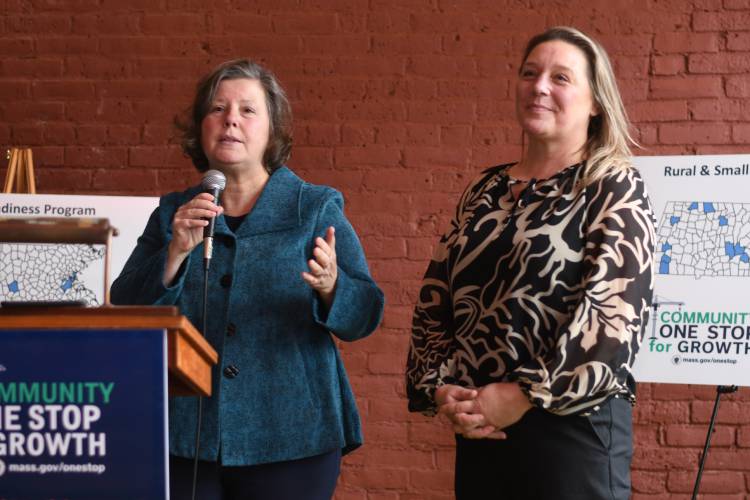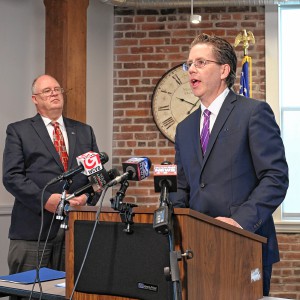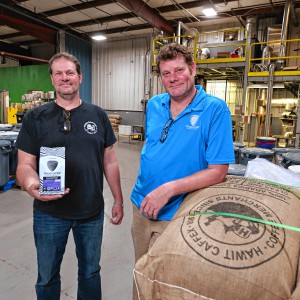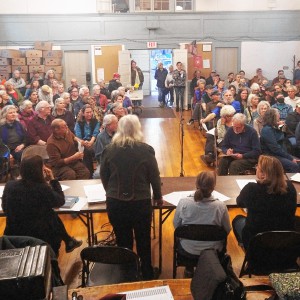Slew of farm bills advancing on Beacon Hill

Sen. Jo Comerford, left, and Rep. Natalie Blais. STAFF FILE PHOTO/PAUL FRANZ
| Published: 01-03-2024 1:04 PM |
A permanent disaster relief fund to assist farmers devastated by acts of nature, and providing farmers more flexibility for using their properties once they are protected in the Agricultural Preservation Restriction program, are among the bills the state Legislature is moving forward.
Filed by state Rep. Natalie Blais, D-Deerfield, the two bills are among a dozen bills the Joint Committee on Agriculture recently advanced and which legislators view as strengthening the food system, fighting food insecurity and supporting farmers, while also protecting natural and working lands.
Sen. Jo Comerford, D-Northampton, who co-chairs the committee with Rep. Paul Schmid III, D-Westport, said the bills can promote food justice and security, provide disaster relief for farms and bolster sustainable agricultural practices.
“This is the first session where we have had a joint committee focused specifically on agriculture, and with it comes an opportunity for the Legislature to focus on the policies needed to support commonwealth farmers and to strengthen our food system,” Comerford said in a statement.
For Blais, the Massachusetts Agricultural Disaster Relief Fund is an idea that comes out of legislation she filed with Comerford following the floods in July that damaged crops and compromised the production of hay. Such a fund would provide monetary assistance to farmers who have suffered agricultural losses, financial losses or property damage due to weather.
The other bill would help farmers to diversify so they remain a strong component of local economic activity, Blais said. They would have more flexibility for using their land by changing the duration of a special permit allowing non-agricultural activities on APR protected properties from a maximum of five years to at least one year. This would allow farmers to more easily access financial benefits from both agricultural tourism and other non-agricultural economic development ventures.
Blais said she recalls attending state Department of Agricultural Resources listening sessions a few years ago where farmers offered feedback on the APR program.
“I introduced this legislation based on the concerns raised by farmers at these sessions,” Blais said.
Article continues after...
Yesterday's Most Read Articles
 1989 homicide victim found in Warwick ID’d through genetic testing, but some mysteries remain
1989 homicide victim found in Warwick ID’d through genetic testing, but some mysteries remain
 Fogbuster Coffee Works, formerly Pierce Brothers, celebrating 30 years in business
Fogbuster Coffee Works, formerly Pierce Brothers, celebrating 30 years in business
 Greenfield homicide victim to be memorialized in Pittsfield
Greenfield homicide victim to be memorialized in Pittsfield
 Real Estate Transactions: May 3, 2024
Real Estate Transactions: May 3, 2024
 Battery storage bylaw passes in Wendell
Battery storage bylaw passes in Wendell
 As I See It: Between Israel and Palestine: Which side should we be on, and why?
As I See It: Between Israel and Palestine: Which side should we be on, and why?
Jared Freedman, chief of staff for Comerford, said the Blais-filed bills are among four bills, in particular, that will be beneficial to farmers in Hampshire and Franklin counties.
In addition to those, there is one filed by Rep. Gerard Cassidy, D-Brockton, that makes anaerobic digestion biogas-to-energy and landfill gas-to-energy facilities that are already operational and qualified as Class I renewable energy sources eligible to participate in the Clean Peak Energy Standard incentive program. Bar-Way Farm in Deerfield is a local farm with such a system that would benefit from such legislation, according to Freedman.
Also aiding local farmers is a bill establishing a food justice frontline, filed by Sen. Patricia Jehlen, D-Somerville, and Rep. Vanna Howard, D-Lowell. This would require the Department of Agricultural Resources to provide up to $500,000 grants to nonprofit food security organizations to enable them to create new food security jobs for individuals living in communities with high rates of food insecurity.
The bill also directs the Department of Transitional Assistance, the Executive Office of Housing and Livable Communities and the Executive Office of Economic Development to establish a program designed to increase public awareness of the availability of food access programs.
“This bill’s implementation of a food justice frontline program will greatly benefit people across the commonwealth by creating jobs and providing assistance for those who may not know help is available,” Jehlen said in a statement.
In a similar effort, Rep. Pat Duffy, D-Holyoke, has a bill that would mandate the Massachusetts Food Policy Council to hire a food system coordinator as a full-time employee.
Other agricultural-related bills that are continuing to make their way toward law would give cities and towns more time to exercise their right of first refusals to acquire agricultural land when put on the market; provide financial assistance to lobstermen and lobsterwomen affected by seasonal fishing area closures to protect endangered marine species; offer a tax credit for those donating used oyster shells to an oyster shell recycling organization; and give Nantucket the ability to regulate nutrient management and fertilizer guidelines, in cooperation with University of Massachusetts Amherst Extension.
Scott Merzbach can be reached at smerzbach@gazettenet.com.

 Bridge of Flowers in Shelburne Falls to open on plant sale day, May 11
Bridge of Flowers in Shelburne Falls to open on plant sale day, May 11 Community Legal Aid expands Disability Benefits Project to Franklin County
Community Legal Aid expands Disability Benefits Project to Franklin County Wear Orange organizers prepare display to remember gun violence victims
Wear Orange organizers prepare display to remember gun violence victims Deerfield candidates, Whately incumbent discuss issues with voters at South County Senior Center
Deerfield candidates, Whately incumbent discuss issues with voters at South County Senior Center
